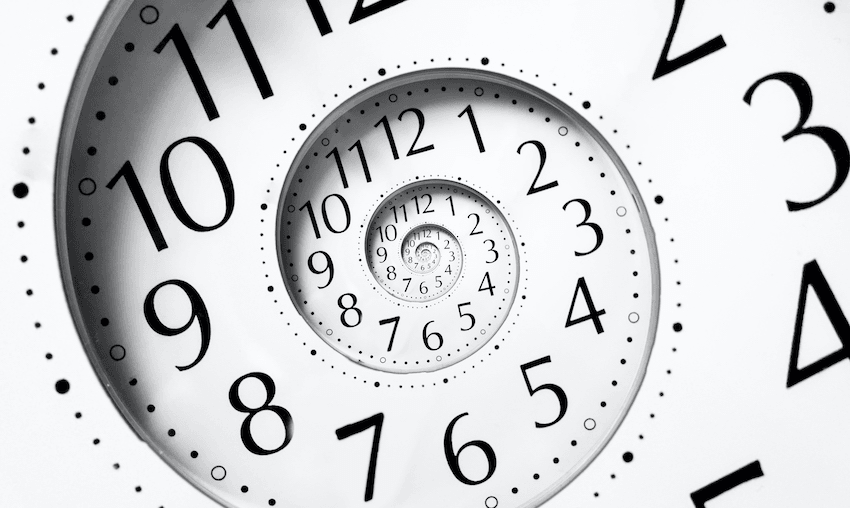After this is all over we’ll divide our lives into before and after Covid, but in the midst of the pandemic we’re already experiencing time in a new way, writes Tanisha Jowsey.
If you’ve heard of epoch time chances are you think it has something to do with 01 January 1970 and computer programming. And you’re right. But it is much more than that.
As described by anthropologist Johannes Fabian, epochs are “sharp” points in time recognised by what happened then: society-shaking events that are limited to that specific period of time. For example, for New Zealanders, the Christchurch earthquakes and mosque shootings marked epochs. So did the moment we went into lockdown.
These are all points in time that have significant meaning for those of us affected. They are so significant that we shape our sense of time and rhythm and routine in relation to them. Where were you when the mosque shootings happened? “Jogging in Hagley Park.” “Working in the Christchurch E.D.” “I was in an ice cream shop at Mission Bay and heard it on the radio and everybody stopped in their tracks.”
The thing about epochs is that they are significant points in time partly because so many people are affected. If Christchurch was a place without people, the earthquakes would have hardly even warranted a mention on the six o’clock news. The significance of 9/11 would be halved had the Twin Towers and the planes that hit them been all but empty. The same could be said for historic events like Pompeii.
So let’s discuss Covid-19. Yes, it has been gobbling up all the air time of late but it is worth noticing a couple of things about the way we experience this pandemic as an epoch. Firstly, the immediacy of Covid-19 is felt most keenly by those who have had the virus. The social ripples of that immediacy are felt keenly too by people with a family member or friend who has had the virus.
Then there are those of us who have had no personal or immediate experience of the virus but whose lives have been critically shaped by it anyway. Some of us have been tested. Some of us have had to queue for hours to get groceries. Some of us have been stuck at home in bubbles with young children, with makeshift “office” spaces, with people we do not want to be near, or without people we do want to be near. We have missed out on funerals, weddings, births, birthdays.
When we went into level four lockdown the rapid change was shocking and disorienting. Gradually we figured out what level four lockdown meant to us. We reflected on issues such as bubbles, connection, borders, risk, safety, time, space and even existentialism (OK, not everyone pondered the meaning of life, but I sure did).
We were in lockdown, in various levels, for about 50 days.
Then we were out of lockdown for about 100 days. Coming out of it felt weird and even occasionally – like when I found myself in an elevator with other people for the first time in months – a little scary. The further away we got from lockdown the more comfortable we felt with recognising it as an epoch. Every day I heard people making sense of their experience in reference to the epoch. “Gee, I haven’t had an espresso since before lockdown,” people said. The vice chancellor of my university held a staff meeting and asked us to acknowledge how fortunate we were to be standing in close proximity to our colleagues with so many freedoms that others overseas did not have. I grinned. We were back on campus. Staff and students were filling corridors with their bubbling noise and it was nourishing.
But it also felt strange. We were moving cautiously from our lockdown epoch in the hope that we were re-joining normal time. But with Melbourne and other countries still in the thick of this brutal pandemic, we felt weary and sad that our freedoms were not shared universally.
And then on Wednesday morning I awoke to a sharp shock. I had four hours to get into the office, collect essentials, purchase nappies and milk, and find craft supplies to entertain the kids for an unknown period of time. I documented the madness in a short film called Rapid.
Our epoch has now extended. Years from now we may refer to the epoch as the first lockdown and the second lockdown (and let’s not dare to even think of the third lockdown). And more years later we will have enough distance to simply refer to the pandemic as a point – an epoch – in time. Right now, the epoch is bound and socially experienced as a temporal lockdown bubble. But later the lockdown bubble will be barely seen in the ocean of this global pandemic. What makes this a truly incredible social experience is that, for the first time in most of our lives, we are connected through a unique global epoch that by its very essence is entirely life-changing.
As business author and academic Michael LeBoeuf once said, “Waste your money and you’re only out of money. Waste your time and you have lost part of your life.” So let’s be grateful for the time we have. Let’s use it to reaffirm what is really important – connection, care, compassion. Because that’s the stuff that resonates beyond space and time – and epochs.
Dr Tanisha Jowsey is a lecturer in the Faculty of Medical and Health Sciences at the University of Auckland. Alison Sims helped with the editing of this piece.
